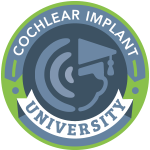Accommodations
College students with disabilities, including students with cochlear implants, have a right to equal access to education under the American with Disabilities Act (ADA) and Section 504 of the Rehabilitation Act of 1973 (Section 504). Unlike high school:
- Colleges are not required to identify students with disabilities in need of accommodations or provide educational plans to meet that need.
- Parents’ rights to access their student’s educational records transfer to the student.
- Students are responsible for disclosing their disability and providing supporting documentation to obtain accommodations.
However, parents can still play an important role supporting their students in the process of securing accommodations by ensuring their students understand legal rights to accommodations in college and have the self-advocacy skills to obtain the accommodations.
Under the American with Disabilities Act (ADA) and Section 504 of the Rehabilitation Act of 1973 (Section 504), colleges are required to provide accommodations to students with disabilities to ensure equal access to education. Colleges may provide similar accommodations to those your student received in high school, including:
- Classroom accommodations
- Preferential seating
- Note taking
- Interpreting—Signed exact English, American Sign Language (ASL), cued speech, or oral
- FM technology
- Audiology
- Captioning
- Communication Access Realtime Translation (CART)
- Testing accommodations
- A quiet environment
- Extra time
In addition, colleges may also provide:
- Housing accommodations
- Visual fire alarms
- Flashing light doorbell
- Other accommodations
- Course substitutions for required or pre-requisite courses
- Reduced course load
- Extended time to complete requirements
Accommodations may vary by college and your student’s specific needs. It is your student’s responsibility to secure accommodations by working with the Office of Disability Services.
As a parent, you play an important supporting role for your student as he or she secures accommodations. In college, it is your student’s responsibility to self-identify as a student with a disability, provide appropriate documentation, and request support.
Under the Family Educational Rights and Privacy Act (FERPA), when your student turns 18 or transitions to college, your rights to access his or her educational records transfer to him or her. Students can grant parents access to these records by signing a waiver. However, the law doesn’t require colleges to work with parents, which could result in delays implementing accommodations for your student. Further, your student will benefit from developing and practicing self-advocacy skills.
You can offer guidance and support to ensure your student obtains the accommodations he or she needs. Your student should:
- Identify potential challenges that he or she may face in their dorm, other on-campus locations, and in the classroom.
- Gather and present supporting documentation of their need for accommodations to the Office of Disability Services (ODS)—Your student should contact the ODS to determine the specific documentation required to receive accommodations.
- Reassess their need for accommodations per semester or as appropriate throughout the school year.
See Accommodations in the College Students section for an overview of academic and residence life accommodations and handouts to support your student.

